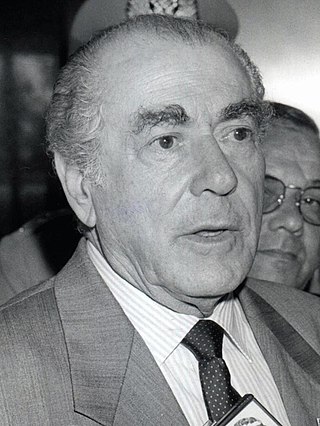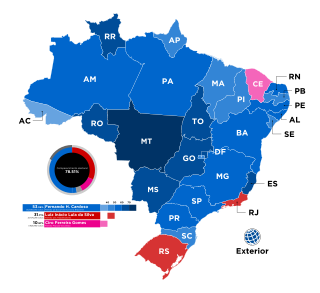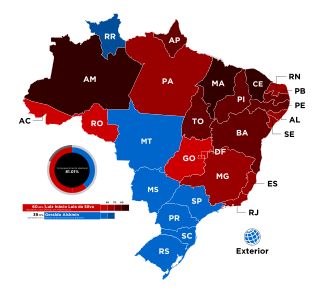
The politics of Brazil take place in a framework of a federal presidential representative democratic republic,whereby the President is both head of state and head of government,and of a multi-party system. The political and administrative organization of Brazil comprises the federal government,the 26 states and a federal district,and the municipalities.

The Workers' Party is a centre-left political party in Brazil that is currently the country's ruling party. Some scholars classify its ideology in the 21st century as social democracy,with the party shifting from a broadly socialist ideology in the 1990s,although the party retains a left-wing and marginal far-left faction to this day. Founded in 1980,PT governed at the federal level in a coalition government with several other parties from 1 January 2003 to 31 August 2016. After the 2002 parliamentary election,PT became the largest party in the Chamber of Deputies and the largest in the Federal Senate for the first time. With the highest approval rating in the history of the country at one time,President Luiz Inácio Lula da Silva was PT's most prominent member. Dilma Rousseff,also a member of PT,was elected twice but did not finish her second term due to her impeachment in 2016. The party came back to power with Lula's victory in the 2022 presidential election.

The Communist Party of Brazil is a political party in Brazil. The PCdoB officially adheres to Marxist–Leninist theory. It has national reach and deep penetration in the trade union and student movements,but little representation in elected positions.

The Brazilian Communist Party,originally the Communist Party of Brazil,is a communist party in Brazil,founded on 25 March 1922. Arguably the oldest active political party in Brazil,it played an important role in the country's 20th-century history despite the relatively small number of members. A factional dispute led to the formation of PCdoB in the 1960s,though both communist parties were united in opposition to the Brazilian military government that ruled from 1964 to 1985. But with the fall of the Soviet Union and the collapse of communism circa 1990,the party lost power and international support. An internal coup in 1992 divided the party and formed a new party,called Popular Socialist Party,using the former identification number of the PCB,23. That party has since moved towards the centre and now goes by the name Cidadania.

The Green Party is a political party in Brazil. It was constituted after the military dictatorship period when limitations on party development were lifted,and,like other green parties around the world,is committed to establishing a set of policies on ensuring social equity and sustainable development. One of the party's founding members was the journalist and former anti-dictatorship revolutionary Fernando Gabeira,Alfredo Sirkis and Carlos Minc. The founding of the Rio de Janeiro section of the Brazilian Green Party was led by a delegation from the southern Brazilian state of Santa Catarina,composed among others by Olga Maria Carvalho Luz,Luiz Henrique Gevaerd Odebrecht,Marcos Bayer,and Consuelo Luz Lins.

Hermes Rodrigues da Fonseca was a Brazilian field marshal and politician who served as the eighth president of Brazil between 1910 and 1914. He was a nephew of marshal Deodoro da Fonseca,the first president of Brazil,and general João Severiano da Fonseca,patron of the Army Health Service. His parents were the marshal Hermes Ernesto da Fonseca and Rita Rodrigues Barbosa.

The Socialism and Liberty Party is a left-wing political party in Brazil. The party describes itself as socialist and democratic.

Leonel de Moura Brizola was a Brazilian politician. Launched into politics by Brazilian president Getúlio Vargas in the 1930–1950s,Brizola was the only politician to serve as elected governor of two Brazilian states. An engineer by training,Brizola organized the youth wing of the Brazilian Labour Party and served as state representative for Rio Grande do Sul and mayor of its capital,Porto Alegre. In 1958 he was elected governor and subsequently played a major role in thwarting a first coup attempt by sectors of the armed forces in 1961,who wished to stop João Goulart from assuming the presidency,under allegations of communist ties. Three years later,facing the 1964 Brazilian coup d'état that went on to install the Brazilian military dictatorship,Brizola again wanted the democratic forces to resist,but Goulart did not want to risk the possibility of civil war,and Brizola was exiled in Uruguay.
Cidadania is a Brazilian political party. It was originally founded as the Popular Socialist Party by members of the former Brazilian Communist Party (PCB),as a centre-left social democratic and democratic socialist party. Despite its left-wing alignment,PPS moved to be opposition against the Workers' Party since 2004,forming alliances with centre-right parties,in particular the Brazilian Social Democracy Party (PSDB),and supporting the Impeachment of Dilma Rousseff. Later the party's National Convention adopted the new naming in March 2019,and it was later approved by the Superior Electoral Court that September. The party then began moving towards a more social liberal position akin to the third way.

The Brazilian Socialist Party is a political party in Brazil. It was founded in 1947,before being abolished by the military regime in 1965 and re-organised in 1989 after the re-democratisation of Brazil. It elected six Governors in 2010,becoming the second largest party in number of state governments,behind only PSDB. In addition to that,it won 34 seats in the Chamber of Deputies and three seats in the Senate,besides having been a member of the For Brazil to Keep on Changing coalition,which elected Dilma Rousseff as President of Brazil.

Anthony William Matheus de Oliveira,also known as Anthony Garotinho,is a Brazilian politician,radio broadcaster and convicted felon. He legally adopted his stage name "Garotinho",originally a nickname he took while working as a radio sports broadcaster.

Anarchism was an influential contributor to the social politics of the First Brazilian Republic. During the epoch of mass migrations of European labourers at the end of the nineteenth and the beginning of the twentieth century,anarchist ideas started to spread,particularly amongst the country’s labour movement. Along with the labour migrants,many Italian,Spanish,Portuguese and German political exiles arrived,many holding anarchist or anarcho-syndicalist ideas. Some did not come as exiles but rather as a type of political entrepreneur,including Giovanni Rossi's anarchist commune,the Cecília Colony,which lasted few years but at one point consisted of 200 individuals.

Tarso Fernando Herz Genro is a Brazilian politician from the southern state of Rio Grande do Sul. An associate of Luiz Inácio Lula da Silva,Genro was a leader of the Workers' Party (PT) in the 2000s.

Presidential elections were held in Brazil in 1989,with the first round on November 15 and a second round on December 17. They were the first direct presidential elections since 1960,the first to be held using a two-round system and the first to take place under the 1988 constitution,which followed two decades of authoritarian rule after the 1964 Brazilian coup d'état.

General elections were held in Brazil on 4 October 1998 to elect the President,National Congress and state governorships. If no candidate in the presidential election received more than 50% of the vote in the first round,a second-round runoff would have been held on 25 October. The election saw voting machines used for the first time in Brazilian history.
Socialism in Brazil is generally thought to trace back to the first half of the 19th century. There are documents evidencing the diffusion of socialist ideas since then,but these were individual initiatives with no ability to form groups with actual political activism.

General elections were held in Brazil on 1 October 2006 to elect the president,National Congress and state governors,with a second round of the presidential election on 29 October as no candidate received more than 50% of the vote in the first round.

Luiz Lindbergh Farias Filho,commonly known only as Lindbergh Farias,is a Brazilian former student union leader and politician.

The Brazilian communist uprising of 1935 was a military revolt in Brazil led by Luís Carlos Prestes and leftist low-rank military against Getúlio Vargas's government on behalf of the National Liberation Alliance. It took place in the cities of Natal,Recife,and the capital Rio de Janeiro between 23 and 27 November 1935. The uprising was supported by the Brazilian Communist Party (PCB),then called the Communist Party of Brazil,and the Communist International.

The National Union of Students is a student organization in Brazil. Founded on 11 August 1937,it represents more than 5 million students of higher education,and is headquartered in São Paulo,with branch offices in Rio de Janeiro and Goiás. Its main objective is to achieve education better conditions in the education sector. Although not officially linked to any political party,since 1980 it has been directed by members coming from the Communist Party of Brazil (PCdoB). In July 2019,the 57th Congress of the National Union of Students elected Iago Montalvão,an economics student at the University of São Paulo (USP),as its new president.


















